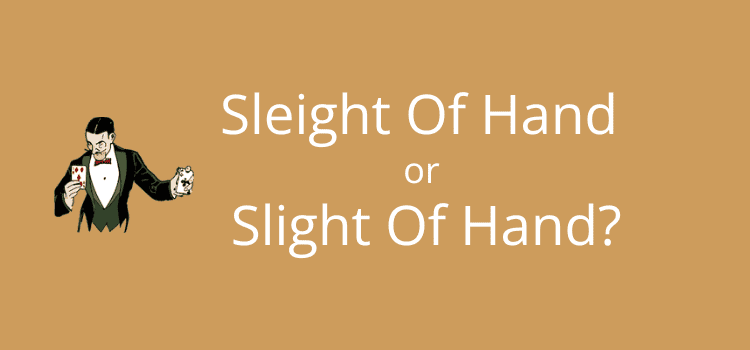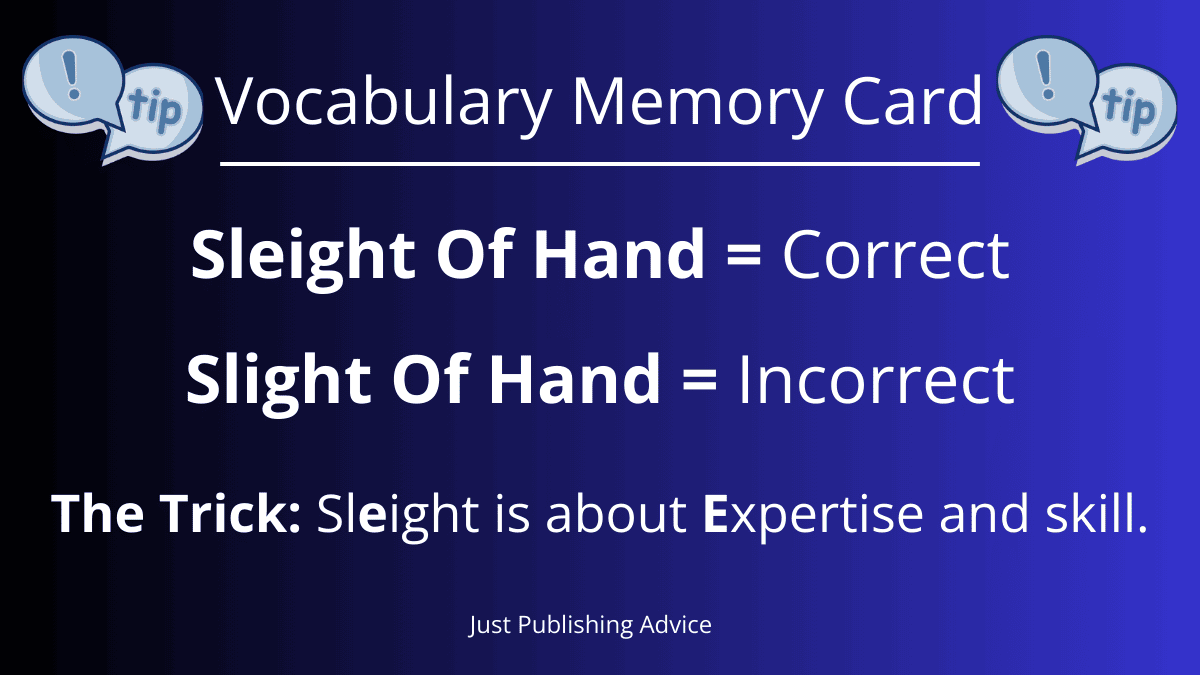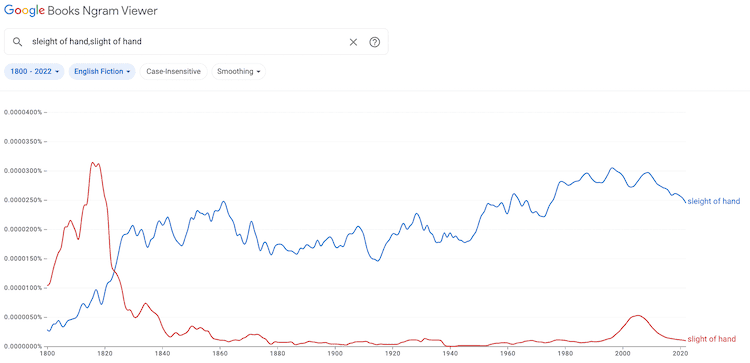
Is it sleight of hand or slight of hand?
The correct spelling is sleight of hand.
While the movements of a magician might be “slight” (small or thin), the word sleight is an old noun meaning skill, dexterity, or trickery.
Simply remember that slight means small and sleight means skill.
Sleight and slight

Yes, the two words sound the same, like many other confusing word pairs.
Sleight means the use of dexterity or cunning, especially to deceive.
It has one sense that relates to physical skills such as adroitness, deftness, or nimbleness of fingers.
However, it can also mean or indicate deception, deceit, double-dealing, chicanery, trickery, or sharp practices.
On the other hand, slight as an adjective means to a small degree or inconsiderable. It can also mean trivial or superficial.
However, when it is a verb, it takes on a totally different meaning. It then means to insult (someone) by treating or speaking of them without proper respect or attention.
From the sense of the verb, the noun slight means an insult.
You can see immediately from the meanings of these two words why sleight is the correct choice.
It refers to physical skills involving the hands and fingers or some form of trickery.
Related expressions with sleight
The word sleight is rarely used in everyday speech or writing.
So, it’s not surprising that there are very few expressions using the noun.
However, there are some.
Sleight of mind
It is an expression that refers to mental tricks or deceptions. It’s similar to sleight of hand but applied to thoughts or mental agility.
It’s sometimes used metaphorically to describe trickery in reasoning or argument.
Sleight of tongue
This is a playful variation referring to verbal dexterity.
It describes someone who is skillful or uses tricky with words to deceive or manipulate through clever language.
Sleight of logic
This expression infers a clever but deceptive use of reasoning.
It involves tricking the mind using arguments or reasoning that seem sound at first but are actually flawed or misleading.
While there aren’t very many expressions, you can see from the examples that they have a commonality related to trickery.
Understanding this will make sure you never get this expression wrong.
Expressions using slight
We use slight and slightly frequently to refer to degree, but oddly, few fixed expressions use the word.
There are a couple, but they take the meaning from the verb, which is to insult or speak without respect.
A slight against
This expression refers to a perceived insult or offense.
For example, he took it as a slight against his abilities.
It’s about someone feeling they were disrespected but in a subtle way.
To take slight
This phrase is used when someone feels insulted or offended by something.
However, it is often when the offense is minor or unintended. It’s similar to the expression, to take offense.
Not the slightest idea
This is a very common expression that means you have no knowledge or understanding of something.
For example, I don’t have the slightest idea what happened.
However, it uses the superlative adjective of degree, which has a different meaning from the verb.
History of the expression
An interesting historical aspect to note is that the expression used the word slight up until the early 1800s.

Slight was a Middle English adjective derived from Old Norse sléttr, meaning smooth.
However, the term evolved over time, and sleight became the more commonly used form.
Sleight derives from the Middle English word sleghth, meaning cunning or skill.
The word aligned more closely with the concept of magic and trickery.
By the late 19th and early 20th centuries, sleight of hand became the standard term, reflecting its association with magical tricks and illusions.
This change may have led to confusion with the correct form of this expression.
Conclusion
As in this case with sleight, some expressions use words that are infrequently used, such as strait and not straight.
It’s easy to get expressions like these wrong if you are not on the ball.
That’s why it always pays to check any fixed expressions in your writing.
I simply can’t bare, no, bear it when I make an error.
Related Reading: Unkept And Unkempt – What’s The Difference?
Share This Article


